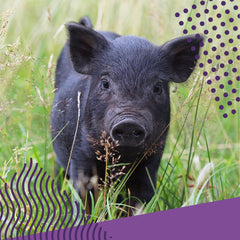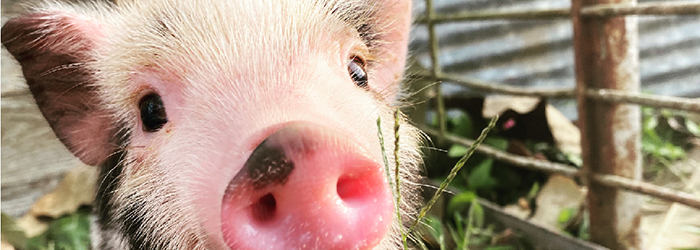Special Considerations for Young Mini Pigs
If you’re welcoming a young mini pig into your home, this is only the beginning of a fun-filled friendship between pet and owner. However, the beginning is one of the most important and impactful times in your animal’s life.
We talked to Mazuri’s own Dr. Nichole Huntley, Ph.D. nutritionist and swine expert, to learn what you should know when caring for a young mini pig.

Start Strong With Proper Nutrition
The biggest difference between an adult mini pig and a young mini pig – besides their age, of course – is their nutritional needs. Young mini pigs are still developing, so the diet you provide should help them in their transition to the next stage of life.
Dr. Nichole says a responsible miniature pig breeder will not sell a baby pig until it has been weaned from its mother. This should be done at age 6-8 weeks at the earliest. At this point, you can help your pet transition past the weaning process by providing a diet with about 20% protein that includes high-quality, milk-based ingredients.
“When a mini pig is young and growing, they need higher levels of protein and energy to ensure proper growth and development,” says Dr. Nichole. “Starting your mini pig off on an appropriate, healthy diet is one of the most important things you can do to help them develop a healthy immune system and prevent future health issues.”
The Mazuri® Mini Pig Youth Diet is formulated to have a higher level of protein for growth as well as more of certain minerals like phosphorous to support healthy bone development. Ph.D. nutritionists like Dr. Nichole ensure this food is made with ingredients that are easily digested by young mini pigs’ developing GI tracts.
Dr. Nichole regularly works with Mazuri quality control teams to make sure all ingredients meet quality standards. As they continue to learn more about the unique needs of mini pigs, Mazuri diets are updated to continue to provide the highest quality nutrition.
“Our diets are formulated by Ph.D. nutrition experts like me to meet the specific needs of young, growing mini pigs with health and longevity in mind,” shared Dr. Nichole.
Adjust Nutrition As Your Mini Pig Grows
For baby pigs still drinking milk, you can help them slowly get used to eating solid food by soaking Mazuri Mini Pig Youth pellets in sow’s milk and allowing them to eat out of a shallow dish. Start with a very small amount of pellets and gradually increase until the piglets are fully weaned. After weaning, make sure to feed your pet 1-1/2 to 3% of their body weight in food each day. Since young mini pigs’ stomachs aren’t large enough to hold much food, Dr. Nichole recommends splitting this amount up into as many meals as you can manage.

Around 8 weeks of age, mini pigs become capable of handling some fruits and vegetables as treats or snacks. However, Dr. Nichole warns this should only make up less than 25% of their diet to be sure the important nutrients provided by the pellets are not diluted too much.
Mini pigs mature relatively quickly. Your pet’s growth rate can start to slow down as early as 4 months of age. This makes it the perfect time to transition from the Youth Diet to the Active Adult Diet. However, since 4-month-old mini pigs are very active and still growing, Dr. Nichole suggests helping your pet adjust to the new diet by gradually mixing it in with their Youth pellets over the course of a couple weeks.
Continue feeding your mini pig the Active Adult diet until they are at least 1-1/2 years old. This is another good time in your pig’s life to reassess their needs.
“For most mini pigs, the transition from the Active Adult Diet to a Mature Maintenance Diet should start sometime between the ages of 1-1/2 and 3 years, depending on the body condition and activity level of your mini pig. Mini pigs living indoors who are less active should be fed a maintenance type diet that still provides all the nutrients they need but is much higher in fiber and lower in protein, so they don’t gain too much weight,” Dr. Nichole shared.
According to Dr. Nichole and other Mazuri experts, active mini pigs in healthy body condition as well as those still rapidly growing should stay on the Active Adult formula longer, while less active and overweight pigs should transition to the Mature Maintenance formula. Keep an eye on your mini pig’s growth and activity to make the best choice for your pet.
Don’t Forget Exercise and Enrichment
While proper nutrition makes for a healthy foundation, pigs are famously susceptible to obesity. From the day you welcome your mini pig home, provide them with plenty of time in a spacious outdoor area where they can be active, move around and express natural behaviors like rooting and grazing. As a pet owner, you will also likely benefit from your pet burning off a little extra energy. Plus, it’s confirmed by experts to be pretty stinkin’ adorable.
If you haven’t already had the opportunity, you will notice quickly that your little pig can have a big personality. They can be quirky, silly and even talkative. And like many of us, mini pigs enjoy being social. Give your companion plenty of attention, belly rubs, treats and maybe a mini pig pal of their own, if you’re able.
Dr. Nichole’s parting advice is to find a good vet for your mini pig early on. With professional care, your pet will be off to the best possible start.
Want to learn more about raising a mini pig? Check out these expert tips and tricks next.
